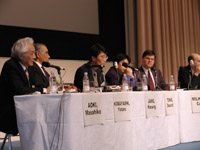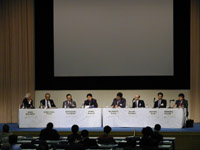Discussion Summary
Participants:
- KOBAYASHI Yotaro, Japan Association of Corporate Executives
- MIYAUCHI Yoshihiko, Japan Association of Corporate Directors
- Frank ALLEN, University of Pennsylvania
- JANG Hasung, Korea University
- Colin MAYER, Said Business School, University of Oxford
- Curtis MILHAUPT, Columbia University
- NIIHARA Hiroaki, RIETI, METI
- TONG Daochi, China Securities Regulatory Commission
Moderator:
- AOKI Masahiko, President, RIETI , Professor, Stanford University
 AOKI:When a company is not doing well, the means of changing the management becomes more important. In the US, takeover is a threat. In Japan, bank control was used. But with bad banks abound and good companies moving away from Japan, the concern is whether or not the system is working. The auditor has been an important institution. How about the outside director?
AOKI:When a company is not doing well, the means of changing the management becomes more important. In the US, takeover is a threat. In Japan, bank control was used. But with bad banks abound and good companies moving away from Japan, the concern is whether or not the system is working. The auditor has been an important institution. How about the outside director?
KOBAYASHI: Yes, Toyota is a successful company of internal directors. But, in my company, we have many outside directors, and we are doing well too. It is useful to have the participation of outside directors. They notice things that insiders do not see. Auditors must have a sense of the shop floor. Accounting scandals in Japan and the US were not due to a lack of accounting knowledge; they were due to a lack of knowledge about the daily operations of the company.
MIYAUCHI: I doubt whether Japan's statutory auditors are integral to the corporate governance structure. They cannot replace top managers. So, the US type of auditing committee structure may be adopted. Our company will adopt this system. We will be the first to do so in Japan.
AOKI: It is difficult to make bold changes in Japan, as there are cultural rigidities. Perhaps an outsider would be able to stimulate change. What about the German experience with outside directors?
 MAYER:It is striking how similar the disciplinary function is in the UK and Germany. Factors that lead to the replacement of managers are similar. Therefore, the evidence for positive effects from non-executive directors is weak. Non-executive directors in the UK have weak fiduciary duties, and often act more like consultants. Sometimes independence is good, sometimes not. Non-executive directors may turn up from time to time and not really know what is going on. The key is how they are informed. They should be able to walk around the company, as do executive directors.
MAYER:It is striking how similar the disciplinary function is in the UK and Germany. Factors that lead to the replacement of managers are similar. Therefore, the evidence for positive effects from non-executive directors is weak. Non-executive directors in the UK have weak fiduciary duties, and often act more like consultants. Sometimes independence is good, sometimes not. Non-executive directors may turn up from time to time and not really know what is going on. The key is how they are informed. They should be able to walk around the company, as do executive directors.
MILHAUPT:There is no evidence in support of one form of corporate governance over another. But now Japanese firms have a choice. In that view, the new Code deserves high marks. I just worry about directors insulating themselves.
AOKI: I have heard that the Chinese Communist Party may have influence in the selection of directors. What is the CSRC doing about this?
TONG: The debate is still on in China. From our perspective, shareholders' interest is important for the capital market. Good corporate governance does not lead to good performance, but bad performance usually leads back to bad corporate governance. Shareholder's interests must be protected.
KOBAYASHI :Stock price is important, but we have to look at the process leading to the result, such as environmental impact or labor rights. People become investors to have a voice in the firm. US shareholder meetings are good because there is interface with activists with causes. Japanese meetings are too formal.
AOKI: There was not a consensus reached during today's conference. But this just proves that it is a deep, rich debate. Further study needs to be done.

